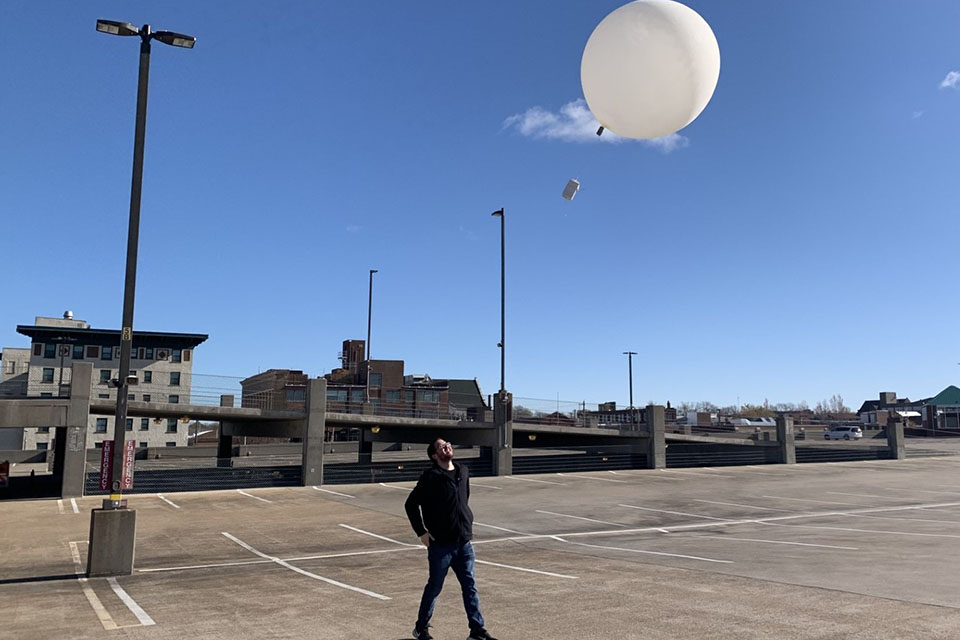Novel Findings from 2017 Lead to Changes in How Experts Will Research the 2024 Solar Eclipse
SLU Research Found St. Louis’ Urban Heat Island Impacted Meteorological Studies
ST. LOUIS – Research published in Atmosphere has shown that in 2017, temperature cooling expected during a total solar eclipse was moderated by St. Louis’ Urban Heat Island (UHI).
Researchers found the short duration of the eclipse cooling and the larger thermal mass of the UHI reduced the magnitude of the temperature drop. The findings have led to changes in how meteorologists will study the 2024 eclipse.

A team of student researchers, led by Robert Pasken, Ph.D., associate professor of Meteorology at Saint Louis University, will use weather balloons to study the solar eclipse on April 8, 2024. The students practiced launching balloons off the Olive Compton Garage at SLU. Here, Riley Jackson looks up at a just-launched balloon. Photo by Maggie Rotermund.
“During the 2017 eclipse the vertical temperature profile along the eclipse center line during totality was not what we expected. To better understand how the temperature changes in vertical during an eclipse we are concentrating on those changes via multiple radiosonde launches and instrumented UAV’s to collect as many vertical profiles as possible,” said Robert Pasken, Ph.D., associate professor of Meteorology at Saint Louis University.
Pasken led the study, “Surface Mesonet and Upper Air Analysis of the 21 August 2017 Total Solar Eclipse.”
A solar eclipse is a natural experiment wherein the radiation of the sun is temporarily removed. That removal typically causes a decrease in temperature and an increase in relative humidity.
In 2017, a team of scientists from Saint Louis University, University of Maryland Baltimore County and the University of Central Florida sought to evaluate how the heat of St. Louis’ urban core would impact temperature, pressure and wind during a total solar eclipse. To do so, they used the QuantumWeather system to gather surface and radiosonde data.
The QuantumWeather meteorological network, developed through a partnership between Saint Louis University and Ameren Missouri, is a permanent surface mesonet and an upper air network of three InterMet sounding systems. The sounding systems are located on the campus of Saint Louis University, at Jefferson Community College and the Ameren-Missouri facility in Cape Girardeau.
Once a minute, at each site, sensors recorded temperature, relative humidity, pressure, wind speed wind direction, wind gust, precipitation and solar panel voltage. The research team looked at real-time temperatures for the hour before, the hour during and the hour after the eclipse.
Novel aspects of the study included:
- Using a dense surface network to sample the eclipse response along portions of the path of totality
- Examining how portion in-homogeneous landscape (rural, suburban and urban) differ in their response to eclipse passage
- Documenting the confounding influence of a thunderstorm outflow that passed through the network at the time of totality
“Although the dense surface network created a unique picture of how the eclipse influenced of the urban heat island, the vertical profiles of temperature and relative humidity at multiple points and times across the eclipse path is also unique,” Pasken said. “The surface weather and radiosonde network is an important tool to study not only the changes in weather due to St. Louis but is also understanding host of other problems facing the St. Louis metro area, with topics ranging from air pollution, urban planning to how the utility industry responds to severe weather.”
In satellite imagery, St. Louis’ UHI was seen to strengthen as the day progressed. Urban sites were defined as those within the immediate St. Louis City and County. Suburban stations are within the St. Louis Metro area and rural are all remaining stations.
When the eclipse began, the temperature drop at all QuantumWeather stations was swift and sustained. The recovery of temperatures in the urban areas was moderated by the urban heat island.
The researchers concluded that the response in the UHI demonstrates that the eclipsed induced cooling was moderated by the UHI, with cooling in the urban core more strongly moderated than in suburban areas.
“We believe that the short duration of the eclipse cooling and the larger thermal mass of the urban core reduced the magnitude of the temperature drop,” Pasken said.
Pasken and a team of student researchers will again be studying the meteorological impacts during the 2024 eclipse on Monday, April 8. The team will send weather balloons and drones up during the totality from a dedicated location in Trail of Tears State Park.
Additional authors on the study include Jeffrey Halverson, Department of Geography and Environmental Systems, University of Maryland Baltimore County; and Peter Braunschweig, Physics Department, University of Central Florida.
Saint Louis University
Founded in 1818, Saint Louis University is one of the nation’s oldest and most prestigious Catholic institutions. Rooted in Jesuit values and its pioneering history as the first university west of the Mississippi River, SLU offers more than 15,200 students a rigorous, transformative education of the whole person. At the core of the University’s diverse community of scholars is SLU’s service-focused mission, which challenges and prepares students to make the world a better, more just place.







